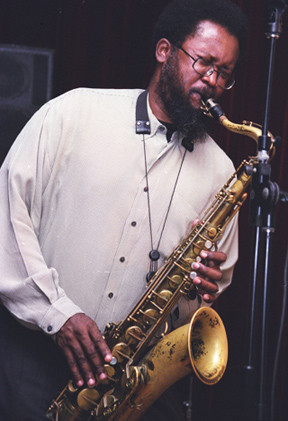The story of jazz saxophonist-composer-scholar-activist Salim Washington paints a harlequin voyage in search of one’s roots. His parents, who were both born in Mississippi’s sharecropper plantations, met in Tennessee in Caperville and got married in Detroit in search of better lives. His mother worked at Levi’s Jeans, while his father was a laborer and a contractor. Salim’s mother died prematurely at twenty-one. He has fond memories of her as a courageous, selfless spirit and a fearless supporter of her family. Salim was inspired by his father’s steadfast determination to finish his education and raise a family while he worked. Salim, the first member of his family to be born on land other than the plantations, was raised in Memphis, Tennessee. Salim’s story of music exposure is remarkable. His family lived in Detroit’s notorious Black Bottom during the 1960-1970 Detroit riots. He was just 9 years old when he was recruited into the neighborhood gang. The leader of the gang was a trumpet player and encouraged Salim to learn how to play. Salim was able to play the trumpet well beyond his leader. The leader noticed the potential in the boy and exempted him from the gang. Salim attributes this gang leader to having introduced him to the trumpet, which was his first musical instrument. After hearing John Coltrane’s Exotica (Call Sonny), and Miles and Monk in Newport, the 1970s were his defining moments. “It was probably the most powerful and intelligent thing I have ever heard. It was about me and the experience that I had, in a more elevated form than any other music I have ever heard. It changed everything.” Salim then bought a saxophone using money he earned from odd jobs. Salim was inspired by the intelligence of Coltrane’s music. This also led to the passion and emotion he experiences from songs like Superfly and church music. This was Salim’s much-needed affirmation that music is a worthwhile pursuit. He was often demoralized by his teachers for his musical ideas, and was subject to racial discrimination at school. Salim entered Harvard University in 1976, but he later dropped out to be a jazz musician. He played with many bands in various cities over the next few decades, including a touring Chitlin circuit band. He became more involved in political activism by organizing protests against Roxbury’s drug dealers and working to support the anti-Bakke decision as well as the Disinvestment movement of South Africa. In 1993, he returned to Harvard and finished his PhD in 2000. He is still active as an actor, writer, activist, and family man. Salim has always been fascinated by South Africa. It all started with Gil Scott-Heron’s hit record Johannesburg, which chronicles the aftermath of 1976 Soweto riots. Salim noticed a physical resemblance between African Americans and South African teens who led the struggle. He began to notice similarities in their cultures, as well their political and social histories. Later, he discovered the music of Chris McGregor and was exposed to South African jazz musicians exiled such as Dudu Pukwana, Mongezi Fez, Johnny Dyani, and felt a strong connection to South Africa. He hoped to one day return to his roots and be closer to his culture, people, and heritage. It would be thirty-three years before Salim made his first trip to South Africa. He was invited to teach at University of KwaZulu Natal (UKZN), in 2009. He returned to New York in the following years and spent the rest of his life performing, writing, and teaching, while also making frequent visits to South Africa. He became a full-time professor at UKZN’s Music Department in 2013. He says, “This feels like home.” Salim is a dedicated teacher, writer, speaker, and performer in many solo, group, and ensemble projects. Salim is currently on tour with the Eco-Music Big Band. This jazz ensemble combines the music of Fred Ho, Cal Massey and political aspects. Fred Ho was his Harvard professor in 1976. They became close friends and political comrades, as well as musical collaborators, when he met Fred Ho again. They met again in 2000, when Fred asked Salim to join his Afro-Asian Music Ensemble. They would continue to work together, giving lectures and playing in various events as a scientific duo. They founded the Scientific Soul Sessions in 2012 as a collective of revolutionaries who wanted to create a scientific and soulful community. One of these progenies is the Eco-Music Big Band. It uses art to inform politics, and vice versa. from www.salimwashington.com
